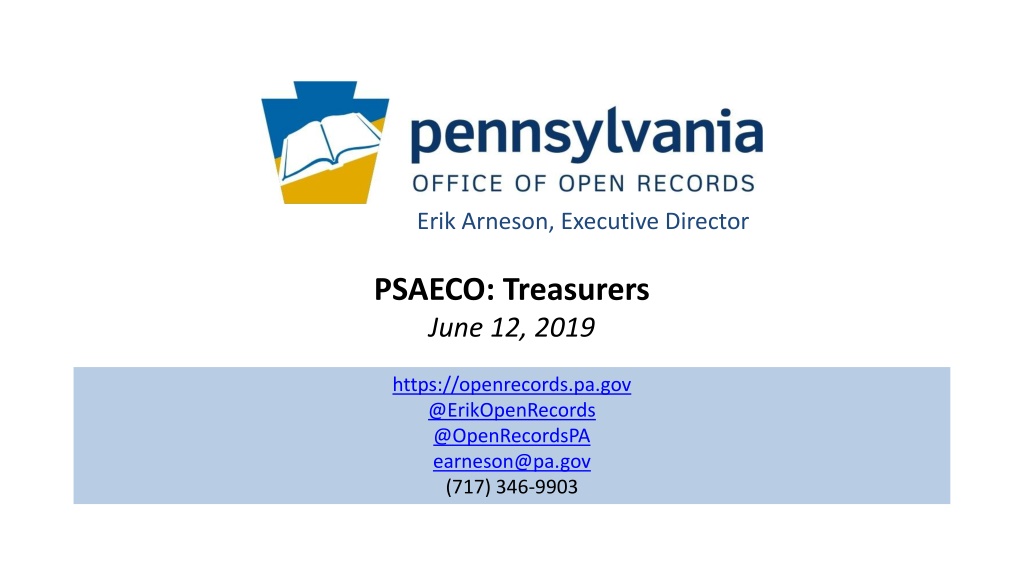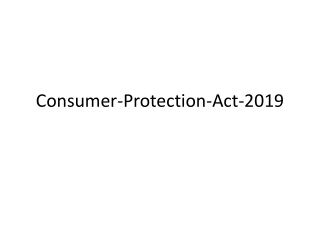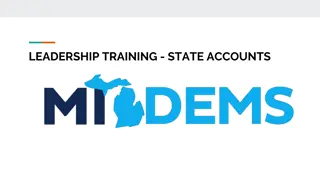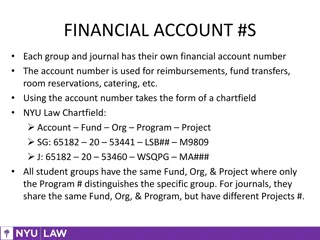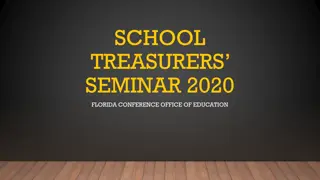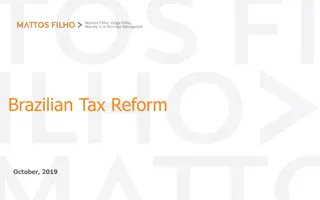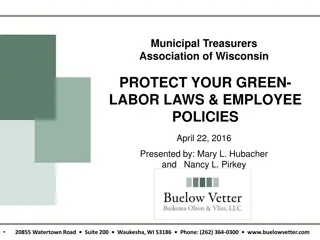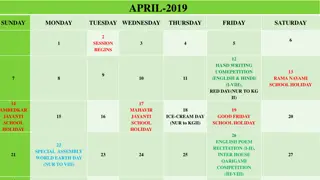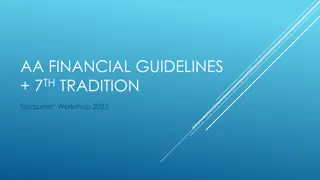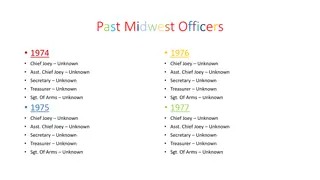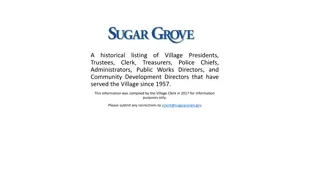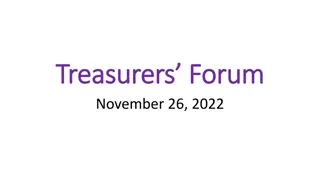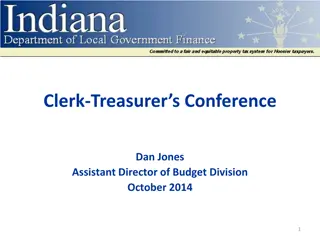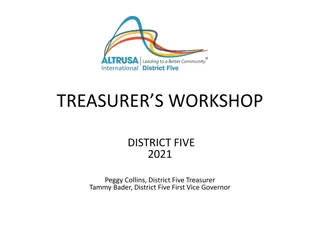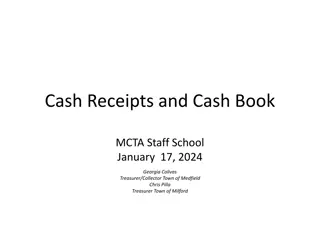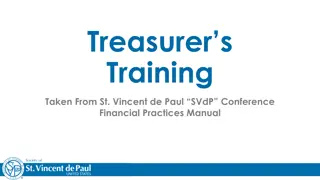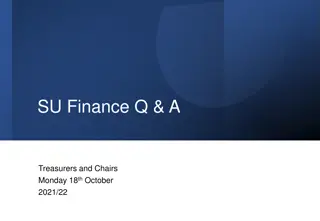Understanding Pennsylvania's Right-to-Know Law
Pennsylvania's Right-to-Know Law allows individuals to request public records from state and local government agencies. This law outlines the process for requesting, granting, or denying access to records, as well as the exceptions and appeal procedures. It defines what constitutes a record and emphasizes the importance of transparency in government operations.
Download Presentation

Please find below an Image/Link to download the presentation.
The content on the website is provided AS IS for your information and personal use only. It may not be sold, licensed, or shared on other websites without obtaining consent from the author. Download presentation by click this link. If you encounter any issues during the download, it is possible that the publisher has removed the file from their server.
E N D
Presentation Transcript
Erik Arneson, Executive Director PSAECO: Treasurers June 12, 2019 https://openrecords.pa.gov @ErikOpenRecords @OpenRecordsPA earneson@pa.gov (717) 346-9903
Right-to-Know Law Basics The very basics of the Right-to-Know Law RTKL allows people to request state & local gov t records Agencies must respond within 5 business days Can sometimes extend deadline by 30 calendar days Requester can grant additional time must be in writing Can grant or deny request, or a combination of both If any part denied, requester can appeal (<2.5% of cases) OOR decides cases in 30 days (requester can grant more time) Either side can appeal OOR decision to court (<10% of cases)
Right-to-Know Law Basics All state & local government records presumed to be public 30 exceptions in the RTKL Fewer apply to financial records & aggregated data Exceptions in other laws & regulations State constitution s right to privacy Attorney-client privilege & other privileges Only if recognized by PA courts; not self-critical evaluation Records can be made non-public by court order
What is a Record? A record is information, regardless of physical form or characteristics, that documents a transaction or activity of an agency and that is created, received or retained pursuant to law or in connection with a transaction, business or activity of the agency PA Office of Attorney General v. Philadelphia Inquirer (No. 2096 C.D. 2014, decided Nov. 19, 2015)
Records Take Many Shapes The Right-to-Know Law Doesn t distinguish between formats Paper, email, texts, social media, audio, video, etc. Doesn t distinguish between agency & personal devices (or agency & personal email accounts) All that matters: Is it a record? And if so, is it a public record?
Receiving RTKL Requests Agencies may see requests submitted in various ways OOR Standard RTKL Request Form The agency s own RTKL Request Form Email, letter, etc. Agencies can adopt a policy to require the use of a form Must accept the OOR Standard RTKL Request Form
Standard RTKL Request Form OOR Standard RTKL Request Form, part 1 7
Standard RTKL Request Form OOR Standard RTKL Request Form, part 1 8
Standard RTKL Request Form OOR Standard RTKL Request Form, part 2 9
Standard RTKL Request Form OOR Standard RTKL Request Form, part 2 10
Receiving RTKL Requests Not everything has to be a formal RTKL request Use common sense What will be most efficient? What will take the least time? Post commonly requested records on website Little (or no) reason to require RTKL request for simple records
Receiving RTKL Requests The Agency Open Records Officer (AORO) is VITAL Treasurer can appoint an AORO, or use the county s AORO AORO receives all requests AORO serves as main point of contact for requesters AORO contacts employees & contractors who may have records AORO tracks deadlines for responses and appeals AORO, when necessary, consults with agency head AORO, when necessary, consults with agency solicitor
Best Practices Experience shows agencies handle RTKL requests best when: AORO receives RTKL training Other staff may also benefit from training Alternate AORO is available when AORO is out of office Agency work is done on agency devices & email accounts A good record retention policy is in place and followed.
Responding to RTKL Requests RTKL is not a confidentiality statute None of the exemptions MUST be claimed Again: Use common sense Records can be released outside of the RTKL An agency may exercise its discretion to make any otherwise exempt record accessible if: Disclosure is not prohibited by law or regulation; and The record is not protected by privilege; and The agency head determines that public interest favoring access outweighs any interest favoring withholding.
Responding to RTKL Requests What agencies must do (part 1) Conduct a good faith search for records Advise all custodians of potentially responsive records about the request employees & contractors Obtain all potentially responsive records from those in possession Review responsive records & assess their public nature Search must be reasonably calculated to find all responsive records
Responding to RTKL Requests What agencies must do (part 2) Maintain all responsive records through all appeals RTKL authorizes courts to sanction for bad faith Consider the constitutional right to privacy PSEA v. OOR, focused on home address but has broader application
Responding to RTKL Requests What agencies are not required to do Do not have to create a record that doesn t exist Do not have to conduct legal research What law gives you the authority to do this thing I don t like? Do not have to create electronic copies if only hard copies exist But it might make sense to do any or all of these Again: What is most efficient?
Responding to RTKL Requests Records commonly held by County Treasurers Licenses: Dog, Fishing, Hunting, Etc. Constitutional right to privacy applies to individuals (human beings) Rubin v. Allegheny County Treasurer's Office (2017-0528) Financial Records Many RTKL exceptions do NOT apply to financial records
Responding to RTKL Requests Requests must be sufficiently specific Unfortunately, no absolute definition of specificity Three-part test: Subject Matter, Scope, Time Frame Subject Matter: Must identify transaction or activity of agency Scope: Types of records (e.g., email, spreadsheets, memos) and/or creator or recipient of records Time Frame: Most fluid of the three factors
Tip: Communicate with the Requester Good communication can prevent and solve many issues Requesters often submit broad requests to ensure they get all the records they want Understandable, but can be expensive & frustrating Requesters don t want surprise bills Agencies don t want unnecessary work Many requesters willing to discuss requests Cannot require requester to provide reason for request If agreement reached on revised request, put it in writing
Fees Under the RTKL OOR fee schedule developed pursuant to RTKL Only required to provide records in existing format Up to $0.25/page for hard copies (8.5 x 11) No charge for electronic records Redactions may necessitate printing electronic records Requesters who seek to inspect records can photograph them Cannot charge for labor or legal review OOR fee schedule (on website) goes into greater detail
Agency Response: Denials If an agency denies a request, it is required by the RTKL to: Provide the denial in writing; Explain what records are being withheld; Explain why records are being withheld; and Explain how to appeal the denial NOTE: Failure to respond by the statutory deadline is a deemed denial & can be appealed
Appealing a RTKL Denial Most denials can be appealed to the OOR If request is denied, appeal can be filed within 15 business days Most appeals filed with the OOR Not Attorney General, Auditor General, Treasurer, General Assembly Not Courts (requests & appeals governed by Rule 509) Denials from local agencies based on criminal investigatory records appealed to county DA (but PSP denials appealed to OOR) Can also appeal redactions (which are denials) & fees
Appealing a RTKL Denial OOR appeal process designed to be simple Requester can file appeals w/ online form at OOR website About 10 to 15 minutes to fill out No lawyer necessary OOR assigns Appeals Officer to oversee case Both sides can present evidence & argument Burden of proof is on the agency seeking to deny access OOR has 30 days to issue Final Determination
OOR Mediation Program RTKL authorizes OOR to establish informal mediation program Goal: Mutually agreeable settlement Voluntary & confidential Either side can end mediation at any time If mediation ends, case moves to normal appeal process (new AO) OOR has trained mediators Can save time & expense
Office of Open Records Created by RTKL: Independent & quasi-judicial Decide appeals filed by people denied access to records Provide RTKL & Sunshine Act training 20 total staff Executive Director & Deputy Director 13 Attorneys (incl. 11 Appeals Officers) Chief of Training & Outreach 4 Administrative
OOR Caseload Thousands of RTK appeals filed every year In 2018, OOR received 2,229 appeals That s total appeals, not total requests No central database of # of requests LBFC Study (released 2018) estimated 109,000 requests received by state & local agencies, combined, in 2016 Anecdotal evidence suggest that has remained fairly steady
OOR Resources Website, Twitter, Email Lists & More Web: https://openrecords.pa.gov/ Blog: https://openrecordspennsylvania.com/ Email lists: Daily Digest of FDs & General Updates https://www.openrecords.pa.gov/EmailSubscriptions.cfm Twitter: @OpenRecordsPA Executive Director: @ErikOpenRecords YouTube Channel Open Records in PA Podcast: Apple Podcasts, Stitcher, etc.
